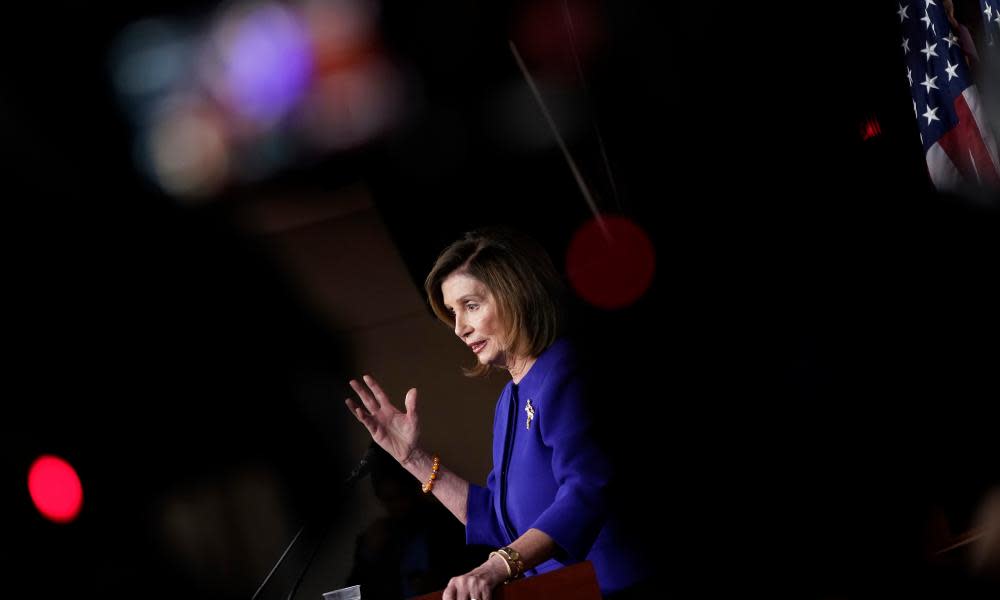House votes to curb Trump's powers to take military action against Iran

The US House of Representatives has approved a resolution asserting that Donald Trump must seek approval from Congress before engaging in further military action against Iran, reigniting a debate over who has the power to declare war.
The war powers resolution is not binding on the president and would not require his signature. But the House speaker, Nancy Pelosi, nonetheless insisted it “has real teeth” because “it is a statement of the Congress of the United States”.
The measure will “protect American lives and values” by limiting Trump’s military actions, Pelosi said. “The administration must de-escalate and must prevent further violence.”
The Democratic-controlled House passed the measure on Thursday by a vote of 224-194 with just three Republicans voting in support. Eight Democrats opposed the measure.
The House resolution came about after Trump chose to take unilateral action last week to assassinate the senior Iranian general Qassem Suleimani without consulting or even notifying Congress.
To stop the president from taking further action against Iran without consulting them, House Democrats have invoked the War Powers Act of 1973, which draws out the parameters of presidential and congressional war powers. With the passage of an Authorization for Use of Military Force (AUMF) in 2001 to fight terrorism, and another AUMF in 2002 for the war in Iraq, Congress’ war powers have diminished since 9/11. Now many lawmakers – especially Democrats – are discussing how to rebalance such powers.
Related: Iran crisis pushes foreign policy to the fore in Democratic primary
In the Senate, a similar war powers proposal by the Democrat Tim Kaine faces much slimmer odds of passing, though Republican Senator Todd Young, an ex-marine who represents Indiana, and two other Republicans indicated yesterday they would back the plan.
Pelosi, in announcing the House vote, called the killing of Suleimani “provocative and disproportionate”.
Republicans denounced the measure, with the Louisiana congressman Steve Scalise calling it little more than “a press release designed to attack President Trump”, while the House minority leader, Kevin McCarthy, called it a “meaningless vote”.
The House vote came a day after the Trump administration briefed lawmakers on its actions in Iran. Democrats and several Republicans called the briefings inadequate, adding that officials did not provide enough details about why the attack was justified.
The vice-president, Mike Pence, said Thursday that Suleimani “was traveling the region making plans to bring an attack against American personnel and American forces”. He said it was not possible to share full details of the intelligence with lawmakers.
“When it comes to intelligence we have to protect sources and methods, there’s only a certain amount we can share with every member of Congress,” Pence said on ABC’s Good Morning America. “But those of us who have seen all the evidence know that there was a compelling case of imminent threat against American personnel.”
Members of Congress have a constitutional responsibility to uphold in authorizing use of military force, Slotkin said, adding, “We are owed concrete, specific details on strategy.”
Trump did not consult with congressional leaders ahead of the attack that killed the Iranian general and afterward sent Congress a notification explaining the rationale, but kept it classified.
Congress has allowed its war powers role to erode since the passage of Authorization for Use of Military Force (AUMF) in 2001 to fight terrorism after the 9/11 attacks, and passage of another AUMF for the invasion of Iraq in 2002.
Fallout from those votes deeply divided Congress and the nation, with many lawmakers, particularly Democrats, now saying they were mistakes. Yet Congress has been paralyzed on the question of whether to repeal or change those authorities.

